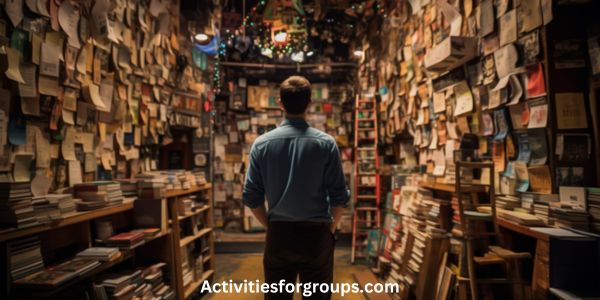Are you interested in group theater workshops? Participating in one can be a great way to hone your craft and learn from others.

But before you dive in, it’s important to know what to expect. In this article, we’ll take a look at the benefits of group theater workshops, how to set up your own, tips for participating, common mistakes to avoid, and resources for further learning.
Let’s get started!
Benefits of Group Theater Workshops
As you take part in a group theater workshop, you’ll quickly see the benefits that come with it. Participating in a group class provides a supportive space to learn and develop new skills, and it can help you to gain confidence in your own abilities.
Group theater workshops are a great way to build your confidence, as you get to practice acting with others, and receive feedback and encouragement from the instructor and your fellow actors.
Another benefit is that group theater workshops can help you to develop your creativity. Through improvisation exercises and other fun activities, you’ll be able to tap into your creative instincts and produce interesting, unique ideas. Working in a group also gives you the chance to learn new techniques, and to take on different roles and characters.
Finally, group theater workshops are also a great way to meet new people who’ve similar interests. Working collaboratively with others can be a great way to build relationships and make new friends, and you’ll be able to learn more about theater from the people around you.
Group theater workshops have many benefits, and can be an incredibly rewarding experience. You’ll be able to develop new skills, gain confidence in your own abilities, and make new friends. So, why not give it a go and see what you can learn?
Setting Up Your Workshop
Before you arrive at your workshop, you’ll want to make sure you’re properly prepared. To get the most out of your group theater experience, you should consider the role playing, group dynamics, and the overall atmosphere of the workshop.
| Role Playing | Group Dynamics |
|---|---|
| Choose a character and stay in character | Establish a safe and comfortable environment |
| Work towards a goal with your character | Balance individual and group needs |
| Respond to others in character | Respect each other’s ideas and feelings |
It is important to keep in mind that this is a collaborative effort. You’ll be working with everyone to develop an idea together. Make sure you take the time to get to know each person in the group and learn everyone’s strengths and weaknesses. This will help create a better overall experience for everyone involved.
Also, be sure to keep an open mind and remain flexible. As the group works through the workshop, the ideas and dynamics may change. Respect the group’s decisions and be prepared to pivot when needed.
Above all, remember to have fun! Group theater workshops can be a great way to express yourself creatively and learn from each other. With proper preparation and a little enthusiasm, you can make the most of your group theater workshop experience.
Tips for Participating in a Workshop

Participate actively in your workshop to get the most out of the experience. One of the best tips for succeeding in a group theater workshop is to embrace any fear you might be feeling. It’s completely natural to feel a bit nervous or intimidated, especially if it’s your first workshop. By acknowledging and accepting your feelings, you can use them to your advantage. It can help to try and push yourself outside your comfort zone and express your creativity.
Another tip is to observe the dynamics of the group and the workshop leader. Take the time to learn how the workshop is structured and how the leader interacts with the group. Understanding this will help you become more comfortable and engage more in the process. Also, be sure to take notes and ask questions throughout the workshop.
Additionally, be sure to be an active listener. Listen to other members of the group and their ideas. Offer your own insights and opinions when appropriate. Help out other members of the group and encourage their ideas.
Last but not least, be sure to take breaks when needed. It’s easy to become overwhelmed in a workshop setting, so be sure to take breaks when you feel overwhelmed. This will help ensure you stay focused and energized throughout the workshop.
Common Mistakes to Avoid
To avoid any mistakes in your first group theater workshop, be sure to take the time to learn the workshop’s structure and the dynamics of the group. Common mistakes to avoid include:
| Mistake | How to Avoid |
|---|---|
| Not role playing | Participate in the role plays and try to stay in character |
| Not actively listening | Listen to others and stay engaged in the conversation |
| Not building trust | Take the time to get to know the other members of the group, and build trust between each other |
| Not expressing yourself | Speak up and share your ideas, but also be respectful of others’ ideas |
Group theater workshops provide a great opportunity to explore and develop your creativity, so be sure to take full advantage of it. Understand that role playing, active listening, trust building, and self expression are all key components of the workshop, and work on mastering each of these skills. With the right attitude and preparation, you can avoid common mistakes and make the most of your first group theater workshop experience.
Resources for Further Learning

Besides the workshop itself, there are plenty of resources available to help you further your knowledge and skills in group theater. To make the most of your experience, take some time to check out these resources:
- Collaborative Writing: Writing plays with others is a great way to learn group theater. Look for classes or workshops that focus on this, or check out online collaborative writing communities and blogs.
- Team Building: Group theater is all about teamwork. Look for workshops or books that focus on team building exercises and strategies.
- Books: There are many great books out there written by experts on the subject of group theater and related topics. Check out a few to get a better understanding of the craft.
- Websites: Check out websites devoted to group theater. They often have great interviews, tutorials, and advice for actors, directors, and playwrights.
These resources can help you become a better group theater performer and learn even more about the craft. So be sure to take advantage of them!
Frequently Asked Questions [FAQs]
What Is the Minimum/Maximum Number of Participants in a Group Theater Workshop?
You can expect a group theater workshop to have a minimum of four and a maximum of eight participants. During the workshop, participants will learn improvisation techniques and gain an understanding of expectations.
What Is the Cost of Attending a Group Theater Workshop?
The cost of attending a group theater workshop depends on the size of the cast and the number of supporting actors. You could save money by bringing in your own cast and crew.
What Types of Group Theater Workshops Are Available?
You can find group theater workshops focusing on a variety of topics. These may include building trust, creative collaboration, and more. Choose a workshop that fits your needs and interests.
What Is the Best Age Group for a Group Theater Workshop?
The best age group for a group theater workshop depends on the focus. Role playing and trust building activities work best with children and teens, while adults may benefit from more advanced techniques.
What Is the Duration of a Typical Group Theater Workshop?
A typical group theater workshop lasts for several hours, depending on the number of storytelling techniques and improvisation exercises offered.
Conclusion
Group theater workshops are a great way to learn the basics of theater and to get creative. With the right preparation and attitude, you can get the most out of your workshop and have an enjoyable experience.
Don’t be afraid to ask questions and make mistakes – that’s the best way to learn. If you need more help, there are plenty of resources available to help you become a better theater artist.




Leave a Reply